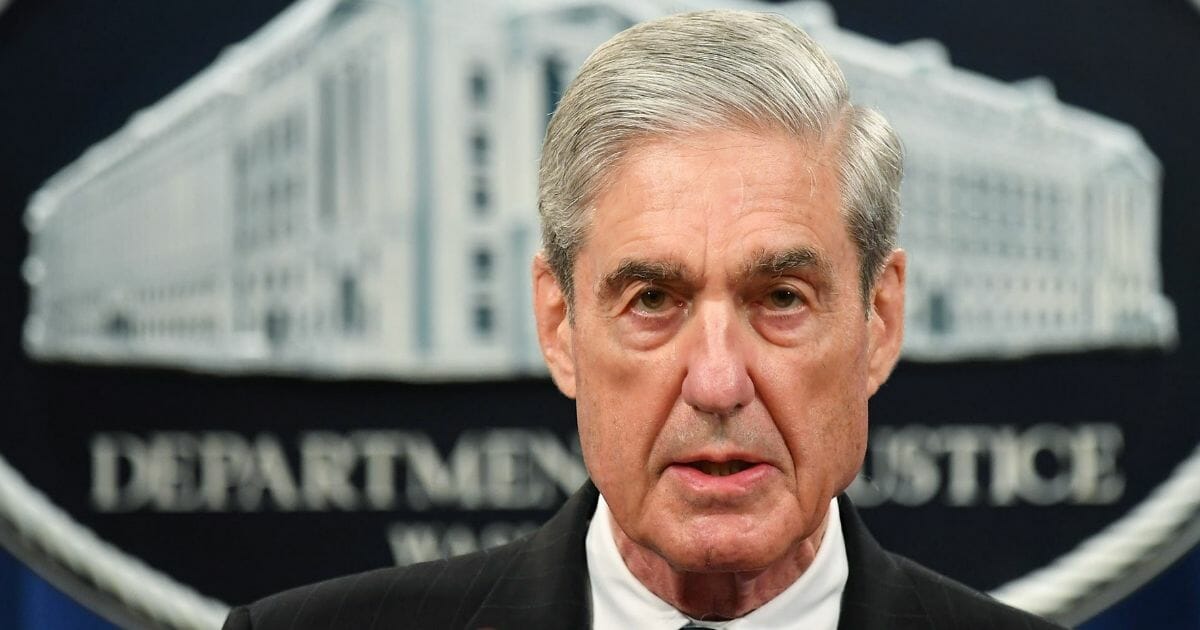
Here's How Mueller Contradicted His Own Report on Collusion in Controversial Public Statement
Former special counsel Robert Mueller contradicted his team’s report on Wednesday, stating there was “insufficient evidence” to find the Trump campaign colluded with Russia, when his investigators determined the Trump team did not.
Further, Mueller’s remarks on the issue of obstruction, particularly why his office of special counsel reached no decision on the matter, appeared to stand in direct conflict to what Attorney General William Barr testified Mueller told him.
During his nine-minute statement after which he took no questions from the media, Mueller explained, “The first volume of the report details numerous efforts emanating from Russia to influence the election. This volume includes a discussion of the Trump campaign’s response to this activity as well as our conclusion that there was insufficient evidence to charge a broader conspiracy.”
The report lays out the two principal means through which the Russians sought to influence the 2016 race: a public information campaign favoring Trump’s campaign run by the Internet Research Agency and the release of Democratic National Committee and Hillary Clinton campaign emails hacked by GRU Russian military intelligence operatives.
Page 2, Volume I, plainly says, “[T]he investigation did not establish that members of the Trump Campaign conspired or coordinated with the Russian government in its election interference activities.”
Further, on page 4, it states that investigators “did not identify evidence that any U.S. persons conspired or coordinated with the (Internet Research Agency).”
Mueller also seemed to directly contradict statements Barr made following the public release of the report, claiming his team did not reach a conclusion on obstruction due to Justice Department policy, which includes an opinion by the DOJ’s Office of Legal Counsel preventing him from indicting a sitting president.
“That is unconstitutional,” said Mueller, adding it was up to Congress to take up the matter, if they deemed it appropriate.
“A special counsel’s office is part of the Department of Justice, and by regulation, it was bound by that department policy. Charging the president with a crime was therefore not an option we could consider,” the former FBI director said.
However, Barr testified before Congress earlier this month that Mueller made clear during a meeting involving himself and then-Deputy Attorney General Rod Rosenstein that the OLC opinion had nothing to do with the special counsel failing to decide whether Trump obstructed justice.
“Special Counsel Mueller stated three times, in response to our questioning, that he emphatically was not saying that but for the OLC opinion he would have found obstruction,” Barr said.
When the DOJ released the report last month, the attorney general recounted at a news conference, “After carefully reviewing the facts and legal theories outlined in the report, and in consultation with the Office of Legal Counsel and other Department lawyers, the Deputy Attorney General and I concluded that the evidence developed by the Special Counsel is not sufficient to establish that the President committed an obstruction-of-justice offense.”
Rosenstein stood immediately behind Barr during that news conference and has not come forward since to say Barr mischaracterized their conclusions or to contradict the attorney general’s account of what Mueller said regarding the OLC opinion and whether Trump obstructed justice.
Spokespeople for the Justice Department and the special counsel’s office released a statement on Wednesday night saying there was no conflict between Barr’s and Mueller’s statements, but did not explain how.
Mark Levin, Fox News host and former chief of staff to Attorney General Edwin Meese during the Reagan Administration, contended Mueller decided to make his public comments on Wednesday to help Democrats, because they were not satisfied with his report.
“Why did Mueller speak today? I’m going to tell you why I think he spoke today. It’s because the Democrats were unhappy with the report, so they wanted Mueller to push the edge of the envelope on collusion, which today he tried to do,” Levin said.
“They wanted him to be more emphatic about the issue of obstruction, where he contradicts the attorney general, the deputy attorney general, which he did today,” he added.
“They have the narrative that they want, and that’s why now [House Judiciary Chair Jerrold] Nadler really doesn’t want to call him to testify. They have their narrative.”
Levin suggested that Mueller and and Nadler likely “orchestrated” the public comments, because the former special counsel does not want to testify.
“There’s 1001 questions to ask this man,” Levin said.
The conservative listed a few topics worthy of inquiry, including the legal team Mueller hired, which included no known Republicans and multiple Hillary Clinton campaign contributors.
Levin also pointed to the so-called Trump Russia dossier, funded by the Democratic National Committee and the Clinton campaign, wondering why Mueller did not look into its origins.
The New York Times reported that there is reason to believe it may have been part of a Russian disinformation campaign.
“Did Mueller say he had evidence of a crime that met the probable cause standard, but could not indict?” Levin asked. “He never says that.”
“This whole d— thing has been a set-up against this president,” Levin said.
Truth and Accuracy
We are committed to truth and accuracy in all of our journalism. Read our editorial standards.
Advertise with The Western Journal and reach millions of highly engaged readers, while supporting our work. Advertise Today.












